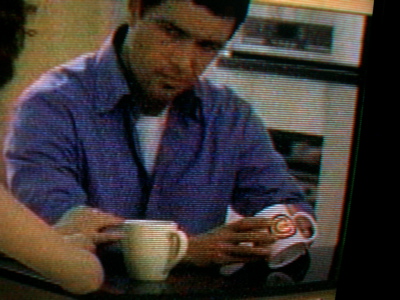The New Yorker’s February 19th issue includes a take-out on “24,” its use of torture as both plot device and tool to extract information from evil-doing characters, and its impact in the real world (“Whatever It Takes,” by Jane Mayer). We’d like to convince ourselves that our prime-time television is all just play acting, that grown-ups can tell the difference between what’s made up and what’s not, and that viewers will maintain a balanced image of the world after immersing themselves in a hyper-violent, hyper-paranoid adventure like “24.” But the article points out that officials in the Army and FBI, people responsible for real-life interrogations and for training those that do them, find “24” not laughably implausible but actually harmful.
The story details a meeting between some of the show’s producers and writers and a group of officials including Army Brig. Gen. Patrick Finnegan, the dean of West Point. Finnegan and “three of the most experienced military and F.B.I. interrogators in the country” met the “24” team to discuss the impact of the show’s depiction of the unrestrained use of torture (Joel Surnow, the co-creator of the show, its executive producer, buddy of Rush Limbaugh, and convinced right-winger, declined to meet with Finnegan et al.). As Mayer recounts:
“Finnegan told the producers that ’24,’ by suggesting that the U.S. government perpetrates myriad forms of torture, hurts the country’s image internationally. Finnegan, who is a lawyer, has for a number of years taught a course on the laws of war to West Point seniors—cadets who would soon be commanders in the battlefields of Iraq and Afghanistan. He always tries, he said, to get his students to sort out not just what is legal but what is right. However, it had become increasingly hard to convince some cadets that America had to respect the rule of law and human rights, even when terrorists did not. One reason for the growing resistance, he suggested, was misperceptions spread by ’24,’ which was exceptionally popular with his students. As he told me, ‘The kids see it, and say, “If torture is wrong, what about ’24’?” ‘ He continued, ‘The disturbing thing is that although torture may cause Jack Bauer some angst, it is always the patriotic thing to do.’ ”
Mayer notes that “24” isn’t the ultimate source of the moral fog surrounding U.S. policy on torture. No, the problem for people like Finnegan is that the our government is in the hands of people who promote torture as an acceptable weapon in our state of permanent war. If you’re paying attention to the regime that Bush, Cheney, Gonzalez and their brief writers are trying to put in place, the troops might be forgiven for thinking that Jack Bauer is a model they might aspire to.
In passing, one of the people who comes out looking OK in Mayer’s story is Kiefer Sutherland, who actually seems to think about the issues his character raises.
Technorati Tags: 24, gwot, tv, war on terror

